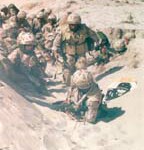

Unexplained chronic fatigue, muscle pain and problems with thinking are experienced by a quarter of Gulf War veterans, and new research suggests exposure to DNA-damaging chemicals may cause this condition, known as Gulf War Syndrome.
Previous studies have suggested that the symptoms stem from a malfunction of mitochondria, the site in cells where molecules that power the body are made. The mitochondria have their own DNA, separate from the cell’s.
Increases in mitochondrial DNA damage the mitochondria’s ability to produce energy, leaving the individual feeling slow and tired. And the new study found direct evidence of increased damage to this cell powerhouse among Gulf War vets.
Researchers analyzed blood samples to measure the amount of mitochondrial DNA and degree of damage to this DNA among veterans with Gulf War Illness (GWI).
The vets not only had more mitochondrial DNA, but also more mitochondrial DNA damage than otherwise healthy adults, the researchers found.
Study author Yang Chen, a doctoral researcher at Rutgers Biomedical and Health Sciences in New Jersey, presented the findings at a recent meeting of the American Psychological Association in Tampa, Fla.
“Future studies are necessary to confirm these findings and determine their association with mitochondrial function. Work in this area may guide new diagnostic testing and treatments for veterans suffering from GWI,” the study’s authors wrote.
More information
The U.S. Centers for Disease Control and Prevention provides more information on Gulf War Syndrome.
Source: HealthDay
Copyright © 2024 HealthDay. All rights reserved.

Leave a Reply